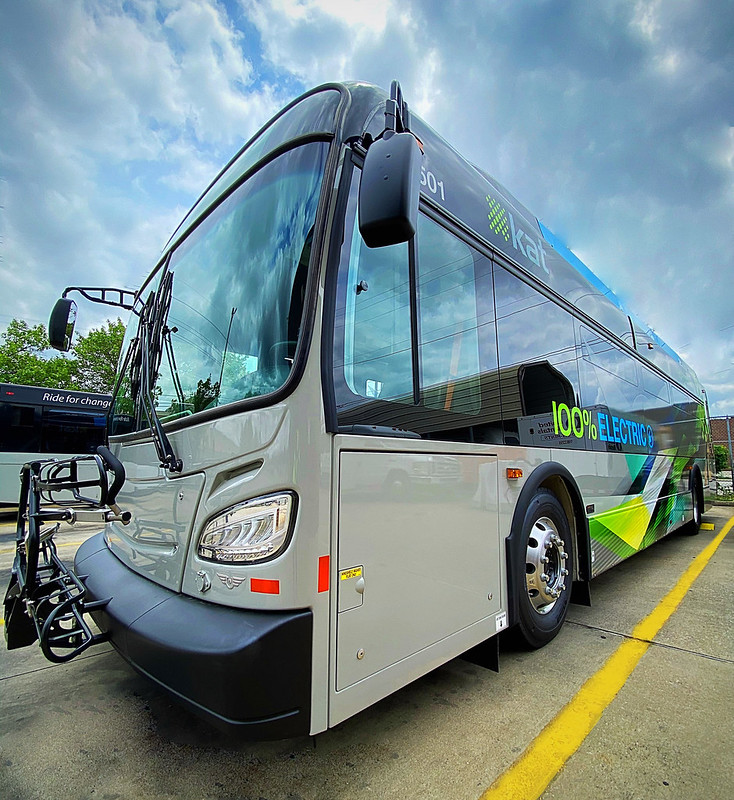The City of Knoxville secures a grant for additional electric transit buses, bring the total of electric buses on the way to 18.
Stan Cross and Guest Blog | July 26, 2021 | Clean Transportation, Electric Vehicles, Tennessee
Brady Watson, former Civic Engagement Coordinator for the Southern Alliance for Clean Energy, also contributed to this blog post.
The City of Knoxville recently secured a $4.8 million federal grant to add six electric buses to the Knoxville Area Transit (KAT) fleet. This investment comes after and will be in addition to, the City’s already-purchased twelve electric buses, which are being delivered on a rolling basis and should be in by September. KAT bus drivers are training on the new electric buses, which drive a bit differently than traditional internal combustion engine buses. The City expects the electric buses to be out on routes by December after training and route planning are completed. The city also has a worthy and applaudable goal to have the KAT fleet 100% electrified by 2030.
Knoxville’s Climate Action Plan
The transportation sector is driving climate change as the largest emitter of carbon dioxide nationwide. For Knoxville (and for all cities), electrifying cars, trucks, and buses are critical to achieving the City’s 80% by 2050 carbon emissions reduction goal. Electrifying transit, including electrifying the City’s vehicle fleet and investing in equitable and accessible electric vehicle charging infrastructure to support community charging needs, is also one of the top priorities by the Knoxville Mayor’s Climate Council, in which we at SACE has been participating for the last year.
Electrifying transportation is a sound climate investment with benefits that grow over time. The electricity powering electric vehicles (EVs) in the Southeast is still mainly coming from fossil fuels, but even so, EVs still cut carbon emissions by over 60% compared to conventional combustion engine vehicles. And as clean energy from sources like solar and wind grows as a portion of the region and nation’s power generation mix, EVs automatically become cleaner. Thus every electric transit bus KAT deploys today will only get cleaner over time as more renewable energy replaces fossil power generation. In contrast, every diesel bus will only get dirtier as efficiency decreases over years of use. Policies such as the Clean Electricity Standard (CES) currently being considered by Congress at the federal level will also help ensure a cleaner grid that will result in cleaner EVs down the road.
Beyond Knoxville: Transit Electrification Across the Southeast
Transit agencies across the country and region have been leading the transition to electrification. Florida is #3 in transit bus electrification nationally. Many local Florida governments are leading the charge, including Miami-Dade County with 75 buses on the way and Pinellas Suncoast Transit Agency deploying six electric buses. In Georgia, the University of Georgia is going all-electric with 33 electric transit buses on the way. The Charlotte Area Transit System in North Carolina is launching a pilot program with 18 electric transit buses to study various manufacturers: the city aims to transition to an entirely electric fleet over the coming decade. And in South Carolina, the City of Seneca became the first city in the country to have an all-electric bus fleet, and nearby Clemson Area Transit is in the process of replacing its entire fleet of 33 buses with electrics by 2023.
It’s not just about climate change
Public Health
Research has shown that Black, Indigenous, and people of color (BIPOC) and low-income (LMI) communities suffer public health impacts of air pollution first and worst. Electrifying transportation eliminates tailpipe emissions that are a leading cause of air pollution and contribute to disease and premature death, especially in overburdened communities. Hence, along with engaging BIPOC and LMI communities early and often in EV program and policy planning and supporting access to electric mobility, electrifying the transit routes that serve these communities is an urgent public health need with immediate and tangible benefits.
Jobs
The Southeast is a leader in EV manufacturing, with over 25 facilities dedicated to producing EVs across all classes, including light-, medium-, and heavy-duty vehicles. The auto industry and medium- and heavy-duty manufacturing sector combined (excluding dealerships) support more than 95,400 jobs in the Southeast, both directly and indirectly, throughout regional supply chains. As of the end of 2020, the Southeast had captured over $64B in EV manufacturing investment. And already, 2021 has seen over $50B in new investments from GM in Spring Hill, Tennessee; Arrival in Charlotte, North Carolina; and Hyundai in Montgomery, Alabama; among others across the EV supply chain.
Looking Forward
Federal funding supports the nation’s transit agencies, and Knoxville, along with every city, will need increased funding access to achieve 100% transit fleet electrification. Center for Transportation and the Environment (CTE) conducted an independent feasibility study that concluded that a nationwide electric transit fleet transition is feasible by 2035 at the cost of between $56.22 billion and $88.91 billion. The Clean Transit For America Plan is a federal legislative proposal that would provide $73 billion for zero-emission bus deployment to help transit agencies transition the 70,000 buses in the nation’s transit fleet to electric. Given the environmental, public health, and job creation benefits that would result, this investment would yield substantial returns.
There is much work ahead to realize Knoxville’s climate action ambitions. This electric transit bus deployment is a meaningful step down the carbon reduction road, and will also improve public health for city residents and support the region’s expanding electric transportation market.
Electrify the South is a program of the Southern Alliance for Clean Energy that leverages research, advocacy, and outreach to promote renewable energy and accelerate the equitable transition to electric transportation throughout the Southeast. Visit ElectrifytheSouth.org to learn more and connect with us.